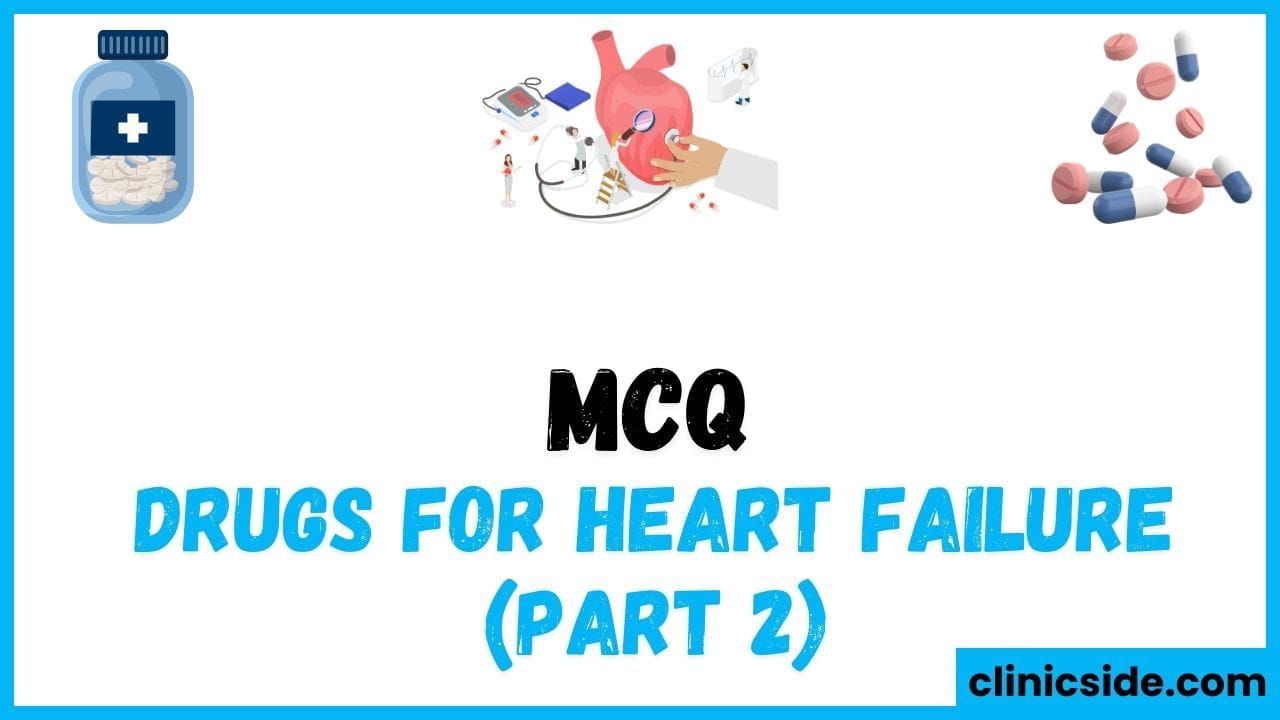Quiz
Available options: 1 to 20
Summary of the MCQs on Drugs for Heart Failure
Managing Acute Heart Failure
For treating acute decompensated heart failure (ADHF), dobutamine (B) is a key drug used to improve cardiac output by increasing heart contractility. This drug is particularly effective in patients with reduced ejection fraction. Another important medication is nitroglycerin (A), which helps reduce preload and afterload by dilating blood vessels, easing the heart’s workload. While digoxin (A) can provide symptom relief in ADHF, it does not impact long-term survival, as it does not address the underlying heart failure mechanisms.
The Role of Beta-Blockers in Heart Failure
Metoprolol (B) is a cardioselective beta-blocker frequently used in heart failure treatment. By targeting beta-1 receptors, it reduces heart rate and myocardial oxygen consumption, which can help manage the symptoms of heart failure. Carvedilol (A), a non-selective beta-blocker, not only blocks beta-1 receptors but also alpha-1 receptors, contributing to vasodilation. Although effective, carvedilol is used less often than metoprolol in heart failure management due to its broader impact on the cardiovascular system.
Neprilysin Inhibitors and Their Benefits
The combination of sacubitril/valsartan (B) is an effective treatment for heart failure with reduced ejection fraction (HFrEF). This medication combines an angiotensin receptor blocker (ARB) with a neprilysin inhibitor to decrease vasoconstriction and improve heart function. By blocking neprilysin, sacubitril increases the levels of beneficial natriuretic peptides that help to reduce fluid retention, lower blood pressure, and improve heart efficiency.
Diuretics and Managing Electrolyte Imbalances
Furosemide (A) is a potent loop diuretic commonly used to treat fluid overload in heart failure. However, it can cause hypokalemia (B), as it promotes the excretion of potassium, which requires monitoring and potential supplementation to avoid serious complications. Spironolactone (A) is a potassium-sparing diuretic often used in heart failure treatment, but it carries a risk of hyperkalemia (A), which must be carefully managed, especially in patients with renal impairment or those taking other medications that affect potassium levels.
ACE Inhibitors and Their Impact
Enalapril (A) is an ACE inhibitor that is commonly prescribed for heart failure. It works by blocking the renin-angiotensin-aldosterone system (RAAS), helping to reduce blood pressure and prevent the harmful effects of fluid retention and vasoconstriction. ACE inhibitors like enalapril can improve heart function, reduce symptoms, and enhance survival, making them a cornerstone of heart failure therapy.
Side Effects of Neprilysin Inhibitors
One important side effect of neprilysin inhibitors (such as sacubitril), is angioedema (B), a serious allergic reaction that causes swelling, particularly in the face and throat. Although neprilysin inhibitors are beneficial in reducing vasoconstriction and promoting vasodilation, the risk of angioedema means they must be prescribed with caution, and they should not be combined with ACE inhibitors due to the increased risk of this side effect.
Milrinone and Improving Cardiac Output
Milrinone (A) is a phosphodiesterase inhibitor that helps improve cardiac output in patients with severe heart failure. It works by increasing calcium influx into heart muscle cells, leading to stronger contractions and improved blood flow. This drug is often used in acute heart failure situations where rapid improvement in heart function is necessary.
Ivabradine in Heart Failure
Ivabradine (B) is a drug used to treat heart failure by slowing the heart rate. It specifically inhibits the funny current (If) in the sinoatrial node, which reduces heart rate without affecting contractility or blood pressure. This can help alleviate symptoms in patients with chronic heart failure, especially when other treatments are not fully effective.
Aldosterone Antagonists and Their Risks
Spironolactone (A), an aldosterone antagonist, plays a vital role in treating heart failure by blocking aldosterone, a hormone that promotes fluid retention. This reduces the strain on the heart, but spironolactone can cause hyperkalemia (A), a potentially dangerous increase in potassium levels. Close monitoring is required to prevent complications related to this electrolyte imbalance.
Treatment for African American Heart Failure Patients
For African American patients with heart failure, a combination of hydralazine and isosorbide dinitrate (B) has shown to improve survival. This regimen addresses the unique cardiovascular challenges in this population, particularly related to sodium retention and fluid buildup. While other treatments like sacubitril/valsartan and beta-blockers are effective, this combination has proven especially beneficial for African American patients.
This summary provides a comprehensive overview of heart failure treatment options, focusing on key medications, their mechanisms of action, and their potential side effects. The proper use of these therapies is crucial in managing heart failure effectively and improving patient outcomes.





